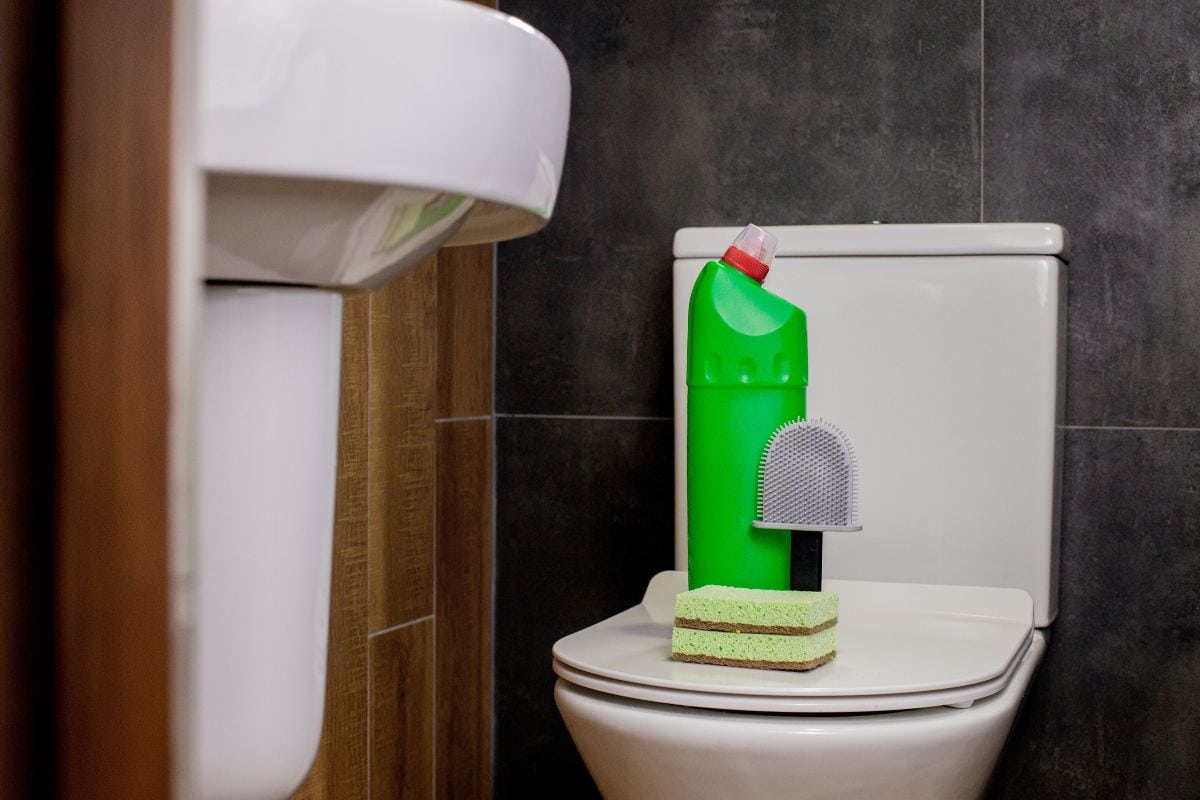Cleaners are typically quite versatile. Toilet bowl cleaners do a really good job at cleaning the white ceramic that toilets are made of. In this article, I will cover whether toilet bowl cleaners are OK to use in the shower.
As a general rule, you can not use toilet bowl cleaner in the shower. Bleach and ammonia should not be used on acrylic and tile showers. Virtually all toilet bowl cleaners contain bleach which has the chemical name sodium hypochlorite.
While most toilet bowl cleaners don’t contain ammonia, the bleach in toilet bowl cleaners is too harsh to use on showers. There are a range of cleaners that can be used to clean a shower, so I’ll cover what those are below.
As well as, what happens if you use toilet bowl cleaner on a shower if toilet bowl cleaner is OK to use on tile grout, and whether toilet bowl cleaner can be used on bathtubs.
What Can Be Used To Clean a Shower
Showers need to be cleaned every so often because, over time, minor amounts of mold, soap scum, and hard water deposits can form on the doors, walls, and base of a shower. So, here’s what can be used to clean a shower.
As a general rule, use a specially formulated shower or tile cleaner. Such as Mr. Muscle Shower Clean and Oxiclean. Regular mild detergents can also be used. Any type of vinegar is extremely effective at removing hard water deposits and soap scum from shower doors and walls.
According to Delta Faucet, a shower and bathroom fixtures manufacturer, bleach and ammonia should not be used to clean your shower. The table below shows some of the most popular toilet bowl cleaners and whether they contain bleach or ammonia.
| Toilet bowl cleaner | Does it contain bleach and/or ammonia |
| Lysol Toilet Bowl Cleaner | Contains bleach, no ammonia |
| Clorox Toilet Bowl Cleaner | Contains bleach, no ammonia |
| Mr Muscle Toilet Bowl Cleaner | Contains bleach, no ammonia |
In general, it’s safe to assume toilet bowl cleaners contain either bleach or ammonia. In some cases, the ingredients list won’t be shown on the label for a toilet cleaner. The chemical name for bleach is sodium hypochlorite. And the chemical name for ammonia is, interestingly, ammonia.
Bleach and ammonia are effective at cleaning toilets. Otherwise, you can typically find the ingredients list online by doing a Google search. So, in some cases, a toilet cleaner will state on the label that they contain either of these chemicals. If they do, do not use it to clean your shower.
One of the most difficult parts of a shower to clean is the see-through door and walls. Vinegar has been found to be very effective to clean these. Here’s a really good video that shows how well it works and how to use it to clean your shower.
What happens if you use toilet bowl cleaner on a shower
In general, nothing will happen immediately if you use toilet bowl cleaner on a shower. But, if it’s used consistently, it will wear away the surface of an acrylic, tile, or fiberglass shower base. Which is the bottom of the shower. It will also discolor tiles and the grout in between the tiles.
Bleach should also not be used on the walls of a shower. Or the see-through panels of the door and walls. It’s not very effective and, over time, will cause wear and tear that will be visible.
The other downside of bleach is that for it to be effective, it needs to sit on the surface for 15 minutes or so. And it needs to be at a high concentration of 10% of the cleaning liquid. Many toilet bowl cleaners contain about 1% to 5% bleach. This means the bleach in the toilet bowl cleaner is ineffective.
Therefore, you should use a cleaner that is specifically designed for tile and acrylic showers. That way, you don’t risk damaging your shower at all. And they will still do a very good job at cleaning your shower. In short, you get all of the benefits and none of the drawbacks.
Can You Use Toilet Bowl Cleaner To Clean Shower Grout
Shower grout is a unique material, and therefore, it’s important to use cleaners on it that won’t damage it. And will also do a good job at cleaning it. Here’s if toilet bowl cleaner is safe and effective to use on shower grout.
Overall, toilet bowl cleaners should not be used to clean shower grout. If toilet bowl cleaner is used on shower grout, eventually, it will discolor, according to cleaning professionals. This occurs due to bleach being a common ingredient in almost all toilet bowl cleaners.
It’s possible to find toilet bowl cleaners that do not contain bleach. But, in general, it’s best to use a cleaner that is specifically designed for grout. One example is Oxiclean.
Can You Use Toilet Bowl Cleaner on a Bathtub
Bathtubs accumulate residue, which is very visible because of the white color that bathtubs have. Toilet bowl cleaner is very effective at making toilet bowl very white. So, here’s if it’s OK to use toilet bowl cleaner to clean a bathtub.
As a general rule, you should not use toilet bowl cleaner on a bathtub. Almost all toilet bowl cleaners contain bleach (sodium hypochlorite). Professional cleaners and bathtub manufacturers recommend not using bleach on bathtubs, as they will remove the finish and discolor them over time.
Therefore, you should use a cleaner that is labeled as safe to use on bathtubs. Or a cleaner specifically designed for cleaning bathtubs. Bathtubs are made of different materials. They can be made out of acrylic, porcelain, and fiberglass. It’s fine to use toilet bowl cleaners on porcelain.
Toilet bowls are also made of porcelain. However, if you’re unsure what your bathtub is made from, then you should use a cleaner that is safe on both acrylic and porcelain. Some products that bathtub manufacturers recommend are:
- Calcium, Lime, and Rust (CLR)
- Power Bathroom Cleaner
- Dishwashing Detergent
- Formula 409 All-purpose Cleaner

Amos Christen graduated with a bachelor’s degree in Interior Design from Drexel University — Philadelphia, PA. Since 2003, Amos has worked with top interior design professionals in this area, including architects and interior/graphic/lighting designers. As a skilled interior designer, Amos Christen is highly versed in fine arts and crafts and uses that to supplement his main area of expertise. He often publishes articles related to home décor on several websites, including Sprucetoilets.com, Sprucebathroom.com, and Mybesuitedhome.com. He also contributes to leading interior design magazines.
